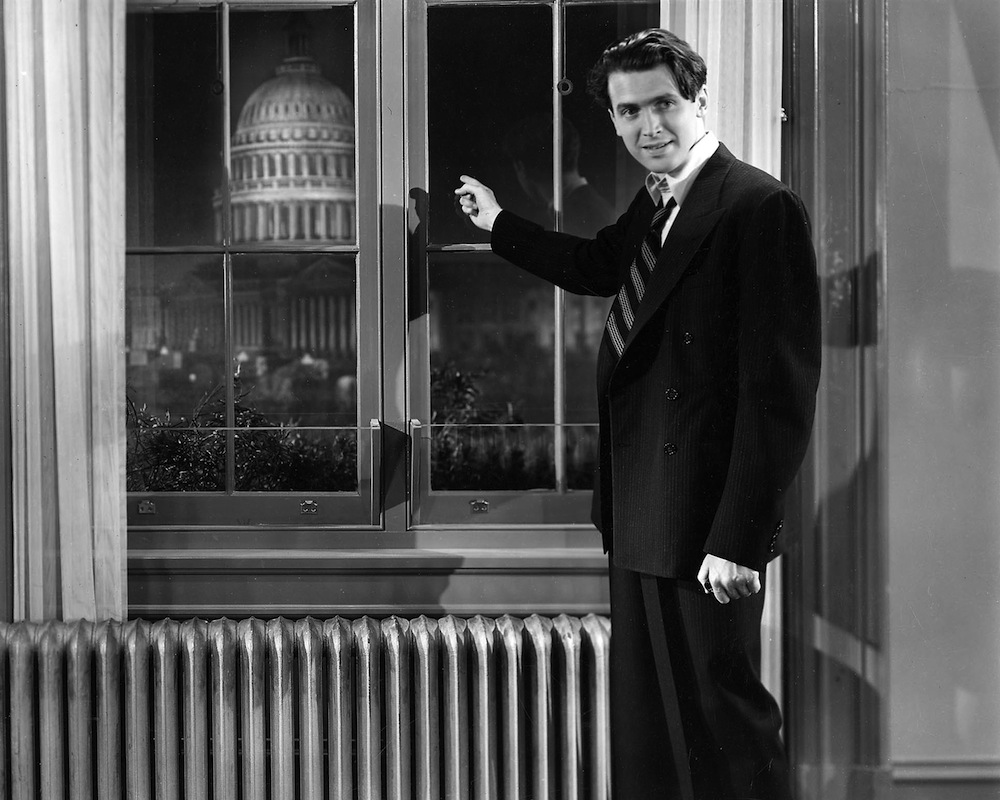
In 1939, Frank Capra had just won Academy Awards for Best Picture and Best Director with his film of the Broadway hit You Can’t Take It with You. His 1936 Mr. Deeds Goes to Town had also roused audiences with its story of Longfellow Deeds (Gary Cooper), a naive bumpkin who inherits a fortune and is beset by big-city predators, including the tabloid press.
Capra had some capital to spend, and he spent it in the Nation’s Capital. His new film, Mr. Smith Goes to Washington, would send a Deeds-like naïf, James Stewart’s Jefferson Smith, to the U.S. Senate, where his dewy ideals collide with the invested power of corrupt lawmakers. When the film opened 75 years ago, on Oct. 19, 1939, the TIME reviewer noted:
This new Capra fable is as whimsical, the Capra directing as slick, the script as fast and funny as in Mr. Deeds Goes to Town. The acting of the brilliant cast is sometimes superb. But Mr. Smith Goes to Washington is bigger than any of these things. Its real hero is not calfy Jeff Smith, but the things he believes, as embodied in the hero of U. S. democracy’s first crisis, Abraham Lincoln.
A U.S. Senator dies, and the state’s governor names Smith, editor of a Boy Scout-type newspaper called Boy’s Stuff, to fill the seat. That’s fine with Boss Jim Taylor (Edward Arnold), who figures he can control Smith the way he has run, through bullying and bribes, the Governor, the local industry, the press, the state legislature and Joseph Paine (Claude Rains), the senior U.S. Senator. When Smith proposes a bill to set aside an area near Willet Creek Dam for a Boy Ranger park, Taylor instructs Paine to denounce Smith as “a contemptible young man with a contemptible scheme,” falsely charging him with secretly owning the land the park is to be built on. Scorned by the entire Senate, but encouraged by his wily Chief of Staff Clarissa Saunders (Jean Arthur), Smith launches an all-night filibuster to prove his innocence and righteousness.
Arthur, who had starred in Mr. Deeds and You Can’t Take It with You, was top-billed, but Stewart carries the film in his first career-defining role. With a plangent voice always breaking as if he’s on the cusp of puberty, Stewart’s Smith proves how a young man’s ideals can trump his own ignorance and the infernal forces aligned against him. Seven years later, Stewart would play an older, more desperate Smith type as George Bailey in Capra’s It’s a Wonderful Life, one of the all-TIME 100 Movies.
In the freewheeling, fire-breathing script by Sidney Buchman, Smith is an overgrown boy searching for a father figure; his own dad was “a struggling editor” whose efforts against men like Taylor led to his death — “slumped over his desk… shot in the back.” (If a politician thinks you’re in his way, he may kill you.) He thinks Paine might be a shining replacement, until he learns of the man’s craven fealty to Taylor. Paine’s rationalization — “I compromised, yes, so that all these years I could stay in that Senate, and serve the people in a thousand honest ways” — sounds like the forlorn words a weaselly Congressman shouts to himself in the bathroom mirror. Halfway through the film Smith realizes that his one and only father figure is the seated figure in the Lincoln Memorial.
Having castigated American governance as a do-nothing cabal of corruption (sound familiar?), Capra then had an even bolder idea: He would premiere Mr. Smith in a special showing hosted by the National Press Club in the capital, with members of the Cabinet and both Houses of Congress present. As TIME reported the following week:
When the picture was over, the audience applauded loudly. [But] Three Senators (who declined to be quoted) upheld Senatorial dignity with these pungent comments on the film: “Not all Senators are sons of bitches.” “Punk!” “It stinks!”
That translates as “How dare he!” — which had to be music to the nervy little Sicilian director. Like Jefferson Smith, Frank Capra had walked into the U.S. Senate, given it a stern civics lesson, endured the catcalls of its denizens and emerged triumphant. Mr. Smith would be nominated for 11 Oscars — winning only for Best Story (Lewis R. Foster) in the sweep year of Gone With the Wind — and became a popular, enduring hit. But Capra’s most savory memory had to be displaying the Senate’s venery to itself. What filmmaker today would have such big steels balls?
Read TIME’s full Oct. 1939 report on the D.C. premiere of Mr. Smith Goes to Washington, here in the archives: Mr. Smith Riles Washington
More Must-Reads from TIME
- Cybersecurity Experts Are Sounding the Alarm on DOGE
- Meet the 2025 Women of the Year
- The Harsh Truth About Disability Inclusion
- Why Do More Young Adults Have Cancer?
- Colman Domingo Leads With Radical Love
- How to Get Better at Doing Things Alone
- Michelle Zauner Stares Down the Darkness
Contact us at letters@time.com